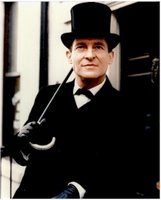Playing the game: taking a fictional character as real
 Say there is a fictional character, and you want to make the stories about him or her more engrossing for yourself. What do you do?
Say there is a fictional character, and you want to make the stories about him or her more engrossing for yourself. What do you do?
Pretending a fictional character is real
One way is to pretend the person really exists, to take the stories seriously and as reality. That way, you can allow yourself to go into it more fully, to put more energy, attention and interest into it than you otherwise would.
And that is exactly what many Sherlock Holmes scholars and fans do. They play what some refer to as The Game: studying Sherlock Holmes as if he was a real flesh-and-blood person, Dr. Watson his biographer, Conan Doyle his literary agent, and the stories themselves histocial documents.
Playing the game to bring out the richness of the stories
In this program on Sherlock Holmes from To the Best of Our Knowledge, Leslie Clinger - author of The New Annotated Sherlock Holmes, talks about The Game, or Holmesian Speculation.
Listen about 25 minutes into the program:
It's a game. And it's a game we play to enhance our appreciation of the story. When we treat them as real, we can justify spending a great deal more effort in researching the background of the stories and in working up explanations for the stories in a way that brings out their richness.
Lila And so it is with our lives as well, according to many mystics and spiritual traditions.
And so it is with our lives as well, according to many mystics and spiritual traditions.
This human self that there is so close an identification with, that seem as an I, that is taken so seriously, that appear so real, so solid, so true. This human self has no I in it anywhere. There is no I in the seeing of it, in the awake space it arises within and as. There is no I in the seen, in this human self and all its aspects: its sensations, feelings, emotions, thoughts, behaviors.
There is no I anywhere in the seeing or the seen. There is only the Ground of empty awakeness the seeing and the seen arises within and as, with no I anywhere. There is doing, yet no doer anywhere. There is choosing, yet no chooser anywhere. This human self just happens, absent of any I. It lives its own life, as anything else in the world of phenomena lives its own life.
This self, as an I, as a separate entity, as a chooser, as a doer, is fictional.
And what makes it a more interesting and engrossing character? To pretend it is real. To take it as I. To have a close identification with it. To live as if it is separate from anything else. To see myself as it, and subject to birth and death, joy and suffering, health and happiness, gain and loss, and all the other ingredients of the human drama.
There is no drama without identification with this human self. And the drama is what makes it engrossing. It is what makes it interesting, at least for a while.
A new flavor of the game: seeking awakening
And then there is a weariness of this drama. A growing readiness to move on. For Ground to awaken to its own nature as awake space, as seeing and seen, absent of I.
There is a new flavor of the game, not much different from all the other flavors, and this one is called spiritual seeking and practice.
This and the other ones are all games where human self is taken as an I, and the new flavor is to try to have this I awaken. Which of course is impossible. This human self can never awaken, and there is no I anywhere anyway - only a temporary and mistaken identification as an I and this human self, but it makes for another interesting chapter of the drama.
A new game: this human self functioning in the context of realized selflessness
And then there is a significantly new game: Ground awakens to - or rather remembers - its own nature, and now the game becomes to allow this human self to live from this awakening, to mature, evolve, interact, experience, explore within this new context of realized selflessness.
It is a whole new section of the story, yet one that is no less juicy. And one that has no end, at least as long as there is a functional connection to human self.